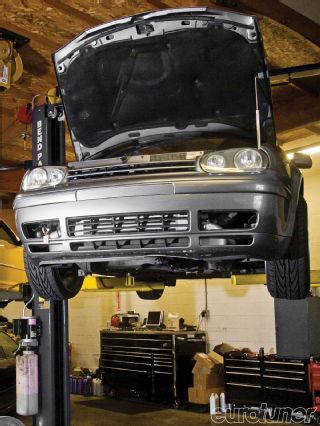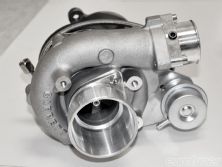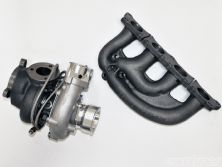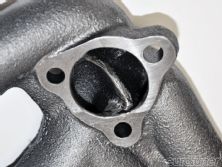 | 2003 VW GTI - Project Silverstone Engine Overhaul Part 4 - Tech
| 2003 VW GTI - Project Silverstone Engine Overhaul Part 4 - Tech
The last three months have been an exciting time for Project Silverstone. After sitting on our ass for years, we've finally made solid progress. Our '03 VW GTI 1.8T won't just be a fancy daily-driven show car anymore; we're going big-turbo!
Stroke & Head
To review, Integrated Engineering (IE) supplied a two-liter stroker kit. Consisting of 83mm Mahle pistons, H-beam rods and a 2.0T FSI crank, the components granted us a bulletproof motor. 034Motorsport rebuilt a high-flow AEB head with a stage 3 porting job, oversized valves, Supertech springs and titanium retainers. An Autotech intake cam raised the powerband further.
Raven Motorsports in Long Beach, CA was responsible for the labor thus far. After spending countless hours disassembling and cleaning the motor, then balancing and installing the new parts, we have spent the last month breaking-in the engine. With no bugs found, we're ready to head up to 034's workshop for more boost.
Turbo Basics
Before we introduce our new goodies, here's a reminder of turbocharger fundamentals. A turbo is a highly efficient pump that compresses air into a small space. It sucks in wasted energy from the exhaust gases, compressing the gas and forcing the energy up the intake path. Mixed with fresh air, it pushes more air into the combustion chamber than atmospheric pressure alone. Additional fuel is matched to create a larger explosion in the cylinders, resulting in more power to the wheels.
Turbo selection is critical. The size and design dictates both the peak and range of power. For our stock 1.8T, a relatively small K03 turbo is used by the factory to spool-up quickly from low RPM to avoid lag and gives consistent power through the rev range.
While good enough for the average Joe, drivers hungry for speed need something bigger. Generally speaking, the bigger the turbo, the more power it creates. But using an extremely large turbo will produce more lag. So it's the job of the tuner to find the perfect compromise.
Gameplan
No stranger to Project Silverstone, 034 prepared our ported AEB head (et 1/11). Our GTI also received 034's track density motor mount kit (et 11/08) and high performance coil packs (et 9/08). With their stellar customer service, years of experience and top-notch work, we were in excellent hands for the next stage.
 |
2003 VW GTI - Project Silverstone Engine Overhaul Part 4 - Tech
|
2003 VW GTI - Project Silverstone Engine Overhaul Part 4 - Tech
For the past few years, 034Motorsport has been developing a turn-key big-turbo solution for the 1.8T. Already offering an application for the longitudinal 1.8T, they haven't officially released a transverse kit for the Mk4 VW platform until now. We're excited to receive one of their first and will be highlighting the fitting and results in the next few issues.
When we spoke to 034, several turbo sizes were under scrutiny. We wanted an application that would give us around 400hp but a broad power range tailored for everyday use. So 034 recommended Garrett's dual ball-bearing GT2871R with internal wastegate.
The turbo is ideal for the peak power and quick response we wanted. And thanks to our stroked 2.0-liter, we could handle the extra abuse, and offer more torque than a 1.8-liter.
However, the tricky part is the exhaust manifold. It must endure incredible abuse from the severe temperature changes, stresses and forces. After testing several manifolds, 034 introduced a new transverse cast manifold.
"Our manifold puts everything in the same position as an Audi TT or S3. It moves the turbo back and away from the transmission. This allows more room for a nice intake," explained Javad Shadzi from 034.
The design featured long runners and has been flow-tested for the best results. It's made using high-nickel cast-iron for heat resistance. Power is rated up to 500hp, so we shouldn't have any problems with cracking or deterioration. If you pop the hood, the manifold and turbo sit behind the motor, so it's quite stealthy.
In case you have different demands than us, 034's manifold will fit any eliminator-style turbo.
More air demands more fuel, so 034 included Bosch 550cc injectors along with a 3" Audi TT MAF housing. The stock fuel pump can only cope with 300hp, so an uprated pump was provided as well, along with a 3" downpipe plus oil and water lines.
The final piece of the puzzle is the ECU. Instead of a standard re-flash, 034 plans to create a custom tune for our GTI. "Every car spec is different, from its intercooler and exhaust to other components. These small changes add up. By getting a custom tune, you get the best results from the hardware you have," Javad told us.
A custom tune requires constant tweaking, so we'll spend a significant time on the dyno and performing road tests once the hardware is installed to adjust the timing, air/fuel and boost. Once everything is done, 034 told us the car should run like cream, with no check engine lights and should even pass local smog tests.



